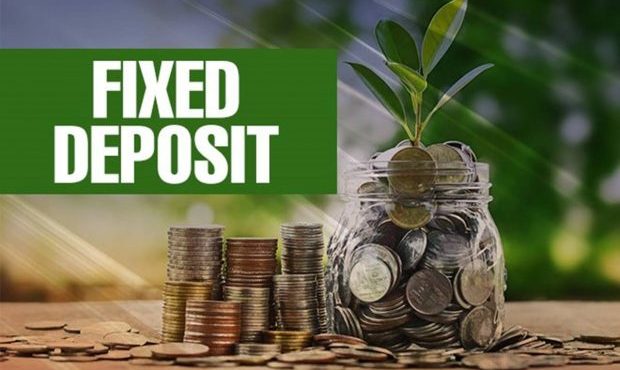What is Fixed Deposit and Why Should Invest in it?: What is fixed deposit? Banks and non-banking financial organizations (NBFCs) offer their customers a fixed deposit, or FD, as an investment option.
 A fixed-term deposit (FD) is an investment in which a certain amount of money is placed for a preset length of time at a predetermined interest rate. Financial institutions provide different FD interest rates, although they are often higher than those offered on savings accounts.
A fixed-term deposit (FD) is an investment in which a certain amount of money is placed for a preset length of time at a predetermined interest rate. Financial institutions provide different FD interest rates, although they are often higher than those offered on savings accounts.
What is fixed deposit’s lock-in period? The length of the fixed deposit is up to the individual who puts his or her money. From a few days to a few years, this position is open to the public. Fixed deposits reward the depositor with set FD interest rates in exchange for locking in their funds. Fixed deposit rates vary from bank to bank. The process of opening a fixed deposit is relatively straightforward and may be done both online and offline.
Short-term deposits (7-14 days) and long-term deposits (10 years) are both options for fixed deposit customers. An alternative name for a fixed deposit is a term deposit.
Reasons To Invest In a Fixed Deposit (FD)
What is fixed deposit? A bank’s fixed deposit is one of the safest and most reliable ways to invest your money. Although many alternative investment options exist, this time-tested asset is still favored by the majority of investors.
Here are a handful of the many reasons why you should invest in a FD:
Liquidity
What is fixed deposit’s liquidity? Liquidity is the ease with which an asset or financial property can be quickly converted into a liquid state or cash. There are no solids in FDs. FDs can be withdrawn at any time, notwithstanding the fact that the holder will be penalized. That way, you’ll always know how much money you’ve got in the bank.
Benefits From Taxes
What is fixed deposit’s relation to tax savings? Section 80C of the Income Tax Act, 1961, provides tax advantages for tax-saver FDs. In terms of taxes, it qualifies as Exempt-Tax-Exempt. You can claim a maximum deduction of Rs. 1,50,000 for the amount invested in such FDs, notwithstanding the fact that the interest earned is taxable.
Revolving credit lines
In the event of a financial emergency, having a fixed deposit (FD) on hand is a wise decision. It’s simple to get a loan from a financial institution against a set deposit or collateral. You can get up to 95 % of the amount of your fixed deposit, depending on the financial institution you choose.
Non-cumulative and cumulative interest rate
What is fixed deposit’s interest rate? You have the option of choosing between cumulative and non-cumulative FD interest rates. This means that you have the option of receiving the interest gains at a time that is convenient for you. You might consider monthly or quarterly payments if you depend on interest income to pay off EMIs and obligations.
Your money can also be held till the conclusion of the tenor. Compound interest, which increases your returns, is a benefit of choosing cumulative terms.
Offers the ability to nominate and sweep in
What is fixed deposit nominee? Nominations are allowed in fixed deposits. When you first start an FD account, you have the option of naming a beneficiary. In any event, as an account holder, you are free to change the nomination at any time.
Sweep-in service is also available to you. Insufficient funds in your account or the shame of a bounced check are non-issues with a sweep-in facility.
Fixed deposits have been the most popular form of investment for Indians for centuries. Flexible and adaptable, this financial tool aids you in establishing a routine of regular saves.
Reliability in the Withdrawal of Funds
When a financial emergency arises, you can quickly and simply access the funds in your fixed deposits before the term expires. Even if you have to pay a fee, it’s easy to get your money back if you withdraw early or prematurely.
This enables you to collect your money when you need it or in the event of a financial emergency. In addition to its security, an FD offers good returns because of its flexibility and the ability to withdraw money at any time.
Invest From a Young Age
Expert advice is available for those who are certain they want to invest but are unsure about the best moment to do so. Many surveys and research have shown that the earlier you invest, the more money you will accumulate. The best time to start investing is while you’re in your early twenties or early thirties.
At an early age, you can learn to be financially independent and disciplined by putting money into the stock market or venturing on other types of investment including an investment as Accredited investors. Investing early teaches you the difference between investing and saving. It is never too early to make an investment since no one is ever too young. Investing a small bit of money now will pay off in the long run. Expert advice can help you decide where to put your money.
It’s always a good idea to sit down with an expert before you begin investing to go over your current financial situation and the best course of action. In the future, you may opt to take charge of your own investments. When it comes to preparing for a secure retirement, no matter what your age, investing can be an important tool.






